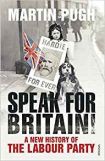Speak for Britain!: A New History of the Labour Party by Martin Pugh
| Speak for Britain!: A New History of the Labour Party by Martin Pugh | |
|
| |
| Category: History | |
| Reviewer: John Van der Kiste | |
| Summary: An account of the Labour Party, from its beginnings under James Keir Hardie to the prime ministership of Gordon Brown. | |
| Buy? Yes | Borrow? Yes |
| Pages: 480 | Date: April 2011 |
| Publisher: Vintage | |
| External links: Author's website | |
| ISBN: 978-0099520788 | |
|
| |
Since the Labour Representation Committee came into existence in February 1900, the party in Britain which it spawned has had a chequered and often contrary existence. Ironically, as Pugh demonstrates, while it may have been formed to represent the workers, it never became a fully working class party. James Keir Hardie may have been a genuine socialist, but some of the senior figures who followed were recruited from middle and upper-class Conservative backgrounds.
It was not just class which caused divisions in the early years. A Puritan strain, opposed to alcohol, tried to restrict the number of public houses, a move which undoubtedly did not concur with the view of Victor Grayson, a fiercely left-wing Independent Labour MP who was legendary for attending the Commons while under the influence of alcohol. This situation descended briefly into farce at a party conference in January 1909 when local Conservatives kidnapped him, drove him into the countryside and plied him with drink, as was evident on his return. Many of the founding fathers disapproved strongly of gambling, often viewed as one of the working man's pleasures, and Keir Hardie once stalked out of a railway carriage because he overheard another passenger telling a dirty story. During the First World War, the party was split between the patriots who strongly defended Britain's role in the war and the pacifists, notably MacDonald who was expelled from the Lossiemouth golf club and received letters headed 'Herr Ramsay MacDonald'. Nevertheless it only proved a brief setback to his career. Within ten years he astonished even many in his own party, to say nothing of the country at large, by taking office as the leader of the first British Labour government.
It is interesting to read of the attitude of Labour's political opponents at around the time they took power. Neville Chamberlain treated members sarcastically and called them 'dirt', while Stanley Baldwin accepted that a Labour government was an inevitability, not a national disaster, even preparing the way for cross-party co-operation in the 1930s.
In telling the story, Pugh enlivens his narrative with several lovely quotes. The 1955 general election was a somewhat tame affair in view of Winston Churchill's recent retirement as Prime Minister, and Emmanuel Shinwell likened the campaign to fighting Snow White and the Seven Dwarfs. Eight years later, the new leader Harold Wilson told his party's left wing that he felt he was running a Bolshevik Revolution with a Tsarist Shadow Cabinet.
Throughout the book is commendably impartial with no sign of bias either way. The author offers some interesting judgements, declaring that Clement Attlee was a good administrator in governments but a poor politician and overrated as a leader, while his successor Hugh Gaitskell was inept and would undoubtedly have lost the 1964 election had he not died suddenly almost two years earlier, and James Callaghan, by party standards a very conservative character, was as tired and bereft of ideas as the man he had replaced [Harold Wilson], as well as being several years older. His analysis of Michael Foot's failings, such as his attack on Lord Hailsham's defence of the Munich agreement in 1938 (in the 1983 election campaign, please note) and in particular his poor and inconsistent handling of the controversial selection of Peter Tatchell as a party candidate for the Bermondsey by-election in 1983, is a shrewd one.
The last chapter has a perceptive analysis on Tony Blair's strategy as a moderniser and frustration with what he thought was the party's failure to change sufficiently under John Smith, a man who according to Roy Hattersley had not changed his mind on anything since he was seven, and the consequences of the Afghan and Iraq wars, the later widely recognised as the country's worst foreign policy blunder since Munich in 1938. It ends with a discussion of the malaise that inevitably followed the euphoria of 1997 and the very changed outlook under Gordon Brown, reflected in its poor performance in the 2009 local elections. Thoughts on the internal conflicts and discussions on its future direction following defeat in the 2010 election are left to the two-page foreword written for this paperback edition.
The book tells the story well, and any serious reader interested in politics and history will find it a very useful, often entertaining read. It is interesting to note that some on the left appear to have found it a disappointment. On its first appearance in hardback it was boycotted by the 'Guardian' and disliked by Hattersley. It is certainly not a bland account, and if it rattles a few cages in the process, maybe that is a measure of its quality. Moreover, I couldn't resist a smile when looking at the index and noticing that the references to Margaret Thatcher end with see also Blair, Tony'.
Our thanks to Vintage for sending a review copy to Bookbag.
If you enjoyed this, three other titles on modern Labour history we can recommend are A View from the Foothills by Chris Mullin, a junior member of the first Blair administration, and from contemporary journalists, The End of the Party: The Rise and Fall of New Labour by Andrew Rawnsley, and The Broken Compass: How British Politics lost its way by Peter Hitchens. A Very British Revolution: The Expenses Scandal and How to Save Our Democracy by Martin Bell focuses on one of the major episodes which bedevilled the last Labour government. For two lengthy but very rewarding general accounts of the 20th century, in which Labour naturally played a significant role, see A History of Modern Britain, and The Making of Modern Britain, both by Andrew Marr.
Please share on: ![]() Facebook,
Facebook, ![]() Twitter and
Twitter and
![]() Instagram
Instagram
![]() You can read more book reviews or buy Speak for Britain!: A New History of the Labour Party by Martin Pugh at Amazon.co.uk Amazon currently charges £2.99 for standard delivery for orders under £20, over which delivery is free.
You can read more book reviews or buy Speak for Britain!: A New History of the Labour Party by Martin Pugh at Amazon.co.uk Amazon currently charges £2.99 for standard delivery for orders under £20, over which delivery is free.
![]() You can read more book reviews or buy Speak for Britain!: A New History of the Labour Party by Martin Pugh at Amazon.com.
You can read more book reviews or buy Speak for Britain!: A New History of the Labour Party by Martin Pugh at Amazon.com.
Comments
Like to comment on this review?
Just send us an email and we'll put the best up on the site.


